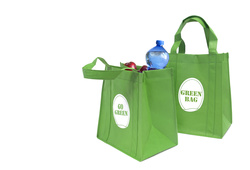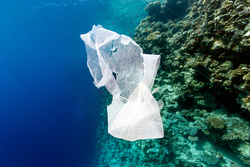New York State Plastic Bag Waste Reduction Law
 Bring Your Own Bag And Protect Our Environment
Bring Your Own Bag And Protect Our Environment
As of 3/1/20, the new plastic bag legislation took effect. However, pursuant to an Order signed in NYS Supreme Court, Albany County on 2/28/20, DEC agreed to take no enforcement action until 4/1/20.
This does not affect the local laws in Suffolk County requiring that the 5-cent paper carryout bag reduction fee must be charged on paper carryout bags.
The new bag waste reduction law took effect on 3/1/20 in New York State - where over 23 billion plastic bags are typically used each year. Plastic bag usage affects both our communities and environment. Plastic bags can be seen stuck in trees, as litter in our neighborhoods, and floating in our waterways. From the significant recycling and disposal issues they pose to the harm they can do to wildlife, the negative impacts of plastic bags are easily seen.
As a consumer, you can help and #BYOBagNY - Bring Your Own Bag. Keep reusable bags in your car, or clip folding reusable bags onto your commuting bag or purse so you always have them handy. If you store them near the door or coat closet, you'll be more likely to remember them on the way out. Remember that every time you use a reusable bag, you are doing your part to prevent litter and waste. Using reusable bags makes sense and is the right thing to do. You can also remind your family, friends, and neighbors to bring their reusable bags whenever they shop.
The Bag Waste Reduction Law applies to more than just grocery stores. Whether you're going to the grocery store, clothes shopping, or to a home improvement store, make sure to bring your reusable bags.
The Bag Waste Reduction Law and Who it Affects
As of 3/1/20, all plastic carryout bags (other than an exempt bag) became banned from distribution by anyone required to collect New York State sales tax. For sales that are tax exempt, plastic carry out bags are still not allowed to be distributed by anyone required to collect New York State sales tax (unless it is an exempt bag). The law affects anyone required to collect New York State sales tax, bag manufacturers and consumers. Cities and counties are also involved. Under the law:
- cities and counties are authorized to adopt a five-cent paper carry-out bag reduction fee. This means that in these areas, a consumer will be charged 5 cents for each paper carryout bag provided at checkout. In areas that have adopted the five-cent paper carryout bag reduction fee, the fee does not apply to SNAP (Supplemental Nutrition Assistance Program) and WIC (Women, Infants, and Children -- a nutrition program) recipients, and they are exempt from paying a paper carryout bag reduction fee for paper carryout bags. One way to avoid paper bag fees no matter where you are across New York State is to always bring your own bag.
- stores covered under the NYS Plastic Bag Reduction, Reuse and Recycling Act are still required to collect plastic bags and other film plastics from consumers for recycling. (Film plastics include items such as bread bags and plastic wraps that come over cases of water, paper towels and other similar items). As a consumer you can help by continuing to recycle these items at participating retailers.
Exempt Bags
Some bags are exempt under the law, so plastic bags may still be distributed to consumers in a few specific circumstances, such as a bag used by a pharmacy to carry prescription drugs, and produce bags for bulk items such as fruits and vegetables. But as a consumer, you can aid in protecting our environment by using reusable bags as much as possible.
For additional information on this New York State program visit: NYS Bag Waste Reduction Law
Types of Bags You Can Use
While shoppers can bring any type of bag -- including film plastic -- note that there are many alternatives to choose from which are more environmentally friendly. Ideally, a bag should be washable and designed for multiple uses, such as one made from cloth. If you forget to bring a bag with you, many retailers will have reusable bags for sale. An alternative, such as paper, may also be available. Please note that not all "person required to collect tax" are required to have bags available for customers. Some stores may choose not to switch to paper and may only have reusable bags for purchase. That is why it is important for consumers to #BYOBagNY - Bring Your Own Bag. If you have a small purchase, such as a magazine, candy or drink, you can help our environment by saying "No thank you" to a single use paper bag and carrying the item instead.
We recommend that you clean your reusable bags regularly. Learn more about best practices for cleaning your reusable bag as recommended by New York State Department of Health.
It’s time to break the disposable bag habit and BYOB!
Flimsy, disposable plastic shopping bags are a common consumer habit in the U.S., and a growing problem across the globe. They clog storm drains and sewers, pollute our streets, parks, and beaches, and kill wildlife. Plastic bags can easily be replaced!
 Plastic waste in our waterways threatens and kills fish and wildlife. Marine animals often mistake plastic bags for food sources, such as jellyfish. Once eaten, the bags cannot be digested, often resulting in starvation. Almost three hundred different species are adversely affected by plastic bag pollution!
Plastic waste in our waterways threatens and kills fish and wildlife. Marine animals often mistake plastic bags for food sources, such as jellyfish. Once eaten, the bags cannot be digested, often resulting in starvation. Almost three hundred different species are adversely affected by plastic bag pollution!
Countless whales, birds, fish and turtles are killed by plastic bags every year. Since plastic is not biodegradable, once an animal dies from consuming plastic bags, the plastic re-enters the environment, only to continue this cycle of devastation.
- Americans throw away over 100 billion single use plastic shopping bags every year, that’s over 300 bags per person!
- The average plastic bag is used for about 12 minutes and then thrown away.
- Between 500 billion and 1 trillion bags are consumed worldwide each year.
- It is estimated that over 200,000 bags are land filled every hour, and once they enter the environment, they can take over 1,000 years to break down.
Solution to Plastic Bag Pollution
Each reusable bag can prevent 1,000 plastic bags from entering our environment!